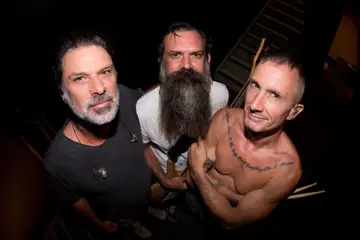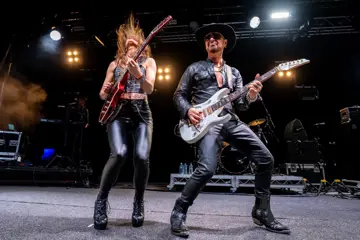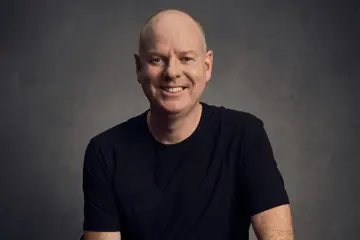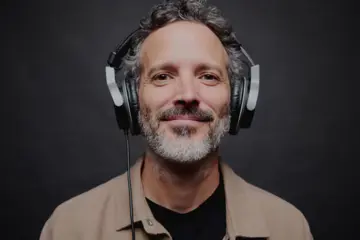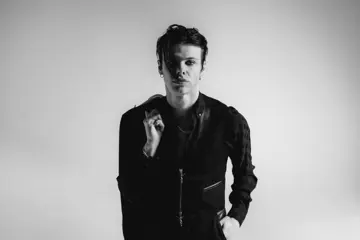PATRIOTS DAY

There’s a grim, ironic scene early in Patriots Day, where the Massachusetts masses have gathered for the running of the 2013 Boston Marathon. Before the race starts, competitors and crowd-members observe a minute of silence, for the victims of the Newtown school shootings just four months prior. It’s an all-too American moment, the grief barely cleared since the last shooting before another tragedy is at hand; this moment lingering, unexpectedly, and especially at a time in which a country is closing its borders so its citizens can continue turning on themselves.
But, fleetingly, it passes. Director Peter Berg has his own tragedy to get to: the ensemble cast briskly introduced, the bombs swiftly detonated, the procedural duly kicking into gear. Based on a book called Boston Strong, it’s, ostensibly, about a city banding together in the face of tragedy. Whilst there is a sense of patriotism, it’s more of a glorification of hard-working heroism than nationalist spirit, of the regular men —who put on their pants one leg at a time— tasked with tracking down, and taking down, those who staged this act of domestic terrorism.
Like all fiction films based on recent ‘real events’, it can feel a little like opportunism; the quick turnaround out to cash in on the marketability of the tragedy, to depict it before the memories —of the blanket media coverage in the event’s wake— start to fade. History once suggested the long lens, but Patriots Day is a work of insta-history; and, in fact, is the third such film in a row from Berg.
Each —2013’s Lone Survivor, and two in 2016, Deepwater Horizon and Patriots Day— stars Mark Wahlberg, casting him as family-man trying to get by in the face of historical tumult. In Lone Survivor and Deepwater Horizon, he was stripped of much of his movie-star charisma, receding into roles that saw him, simply, as a man fighting for survival; be it as a soldier in Afghanistan, or an off-shore driller suddenly thrown into hellish disaster. Here, Wahlberg plays a demoted cop with a bum knee and a drinking problem, but the performance feels like a facsimile of his comic turn in The Departed: Wahlberg a foul-mouthed Masshole with an authority problem, chewing the scenery when, around him, the rest of the film strives for dignity.
Don't miss a beat with our FREE daily newsletter
It’s not surprising to learn that Wahlberg’s cop character is the film’s one fictional composite; the genre stereotype inserted into history. The rest of the top-line cast —John Goodman, Kevin Bacon, J.K. Simmons— play men who were actually on the job; and, yes, as with Sully and Hacksaw Ridge, there’s another quasi-documentary, featuring many of the real figures turned talking-heads, as credit-roll epilogue.
The vast ensemble are all folk who intersected with history; the screenplay (by Berg, Matt Cook, and Joshua Zetumer) gathering disparate characters who’ll, eventually, all be ‘connected’. There’s a sinking sense of doom —underlined by the duly-uneasy score from Trent Reznor and Atticus Ross— about all the happy couples and would-be paramours we meet early in the film; the sense that tragedy awaits.
In this way, it’s not so different a device from the cop boasting about his imminent retirement (perhaps aboard the boat Live-4-Ever): gilding innocence and guilt, stoking our soon-to-be-enflamed desire for retributive justice, from the get-go. Whilst Berg’s shaky-cam, mock-vérité visual approach echoes on-the-ground documentary filming, Patriots Day is, essentially, an action movie: cops on the case of villains, racing to stop them before they kill again. If you’re of the belief that the obsessive media coverage of perpetrators only glorifies them, offering any would-be mass-murderers dreams of their own future infamy, then Patriots Day commits that simplest of sins.
Berg shows the banality of the men behind the bombings: Russian-born brothers who’d become radicalised by internet videos, whose domestic lives run counter to their projected religious purity; one an enthusiastic consumer of porn, the other a dorm-room dope-dealer. When on the run from the cops, they’re petty, bickering; squabbling siblings in over their heads. When they car-jack a luxury SUV, they boast to the driver (Jimmy O. Yang) that they were behind the bombings, only underlining the point about media exposure, and Berg’s bringing of these acts to screen.
Soon enough, we’re speeding towards the final showdown, a suburban-streets shootout liberally filled with explosions. I’m sure this big-screen barrage is historically accurate: Berg famously —or, perhaps, infamously— having consulted autopsy reports when making Lone Survivor, so as to depict his screen deaths just as they happened. But for all its research and accuracy, the film tells the kind of narrative that Americans —especially if their election results are to go by— want to hear: immigrants will try and blow us up, but strong we stand together.
Like Deepwater Horizon, which refused to pull out for a big-picture portrait of unimaginable environmental disaster and grotesque corporate malfeasance, Patriots Day focuses only on men-at-work, doing their jobs. There’s no mention of the ignominy of the ‘pursuit’ for the suspects, in which online sleuths fingered the wrong suspects, Twitter mobs mobilised with racist pitchforks, and the internet was swamped with false reports, fake news, and fraudulent claims. On the big screen, putting a call out to the world to help find the bad guys is a glorious act of outsourcing and civic responsibility, but on small screens, at the time, the ‘reality’ was anything but.
GOLD

Here’s where the McConaissance ends: Matty Mac, that Golden Lion of the screen, plastered with a bad-teeth denture and a strapped-on paunch, balding and comb-over-strewn, trying his best to drag a faltering Prestige Picture to glory. The rejection of the flattering glow of movie-stardom —in short, ‘going ugly’— has been, in the past, a short-cut to awards-show ceremonies, but Gold, it seems, is a bridge too far; the film’s failure —as Oscarbait, at the box office, as actorly vessel for its dressed-down star— suggesting a scant crowd for an ugly Matthew McConaughey.
Or, it could be that Gold just doesn’t quite cohere into something great. Like Patriots Day, it’s based on a true story, but, only very loosely: the dates, names, facts and figures changed in service of the drama; this less true tale, more spun yarn. The director is Stephen Gaghan, unseen since 2005’s Syriana, but it’s not his script; instead, it’s penned by TV vets John Zinman and Patrick Massett, in their first cinematic work since —no shit— 2001’s Lara Croft: Tomb Raider. They’re never quite sure what they want Gold to be, its three acts essentially divided into discrete genre.
First comes an into-the-wilderness adventure, when non-handsome McConaughy —a down-on-his-luck, forever-drunk Nevada prospector— and eternally-handsome Édgar Ramírez head into the Borneo jungles, in search of all that glitters. Then, it tilts into a Scorsese-esque portrait of ill-gotten lucre and mounting hubris, all period-’80s wardrobe and pop-song and greed. Finally, it turns quasi-caper-movie, all getting-away-with-it shenanigans and double-crosses (replete with an unexpected turn at the end).
This means that, for all its widescreen imagery, serpentine screenwriting turns, and stacked cast (Bryce Dallas Howard, doing a lot with a generic long-suffering wife role; Bruce Greenwood, Bill Camp, Corey Stoll, Toby Kebbell, Timothy Simons), Gold plays as but alluring, offering flickering glints of cinematic riches, only to, ultimately, feel somewhere between tease and commodity.
FENCES

Fences is a classic work of stage, and it’s duly stagey: set in one backyard, a symbolic fence making its way, slowly, across it; a work of Chekhovian weight, a study of black masculinity writ in virtuoso speeches. Bringing it to screen, Denzel Washington —as both director and star, adapting a screenplay penned by its late playwright, August Wilson— has to, then, make a choice as to how to adapt it. Preserve the claustrophobic single location of the play, or fashion something more cinematic? He gently attempts to do the latter, but the few diversions —passing-of-time montages, journeys into other reaches of the house, and out onto the photorealist-CGI 1950s-Pittsburgh streets— don’t add much to the film.
It’s those moments that most resemble its source text in which Fences conveys its force. It’s, of course, an actor’s piece: not just in its garrulous strings of words, its volleying verbiage, its spun yarns, and its moments of spoken fury, but in its perceptive observations of human behaviour, and nature; in the way that characters carry depth, contradictions within. The fence of its title is the big symbol, but there are so many other symbolic signifiers littered throughout the text, which is about family, legacy, abuse; the way the black experience, in America, has been such a fight that its men —and they’re almost entirely men— are forever fighting, furious.
It’s an actor’s piece, and the actors here shine: Washington, who previously played his central role on Broadways stages, stirs up an alchemical quality of gravity, insecurity, and bluster. Viola Davis can convey so much in a look, in body language, in the way words and gestures can betray each other; but she also gets an Oscar-reel-ready speech, all tears and snot and guttural defiance, years unloosening in an instant. They eat up most of the screen-time, but just as fabulous is Stephen McKinley Henderson, who lingers on the periphery, a friendly figure, chatty and warm. He starts out seeming comic relief, but, in moments in which Washington essentially bullies wife and children, we see Henderson become both audience surrogate —staring, horrified, off to the side— and enabler. We all watch idly as a man of lords over his patch of yard, a patriarch naked on stage, grappling with the mantle of masculinity, and how much his life matters.
TONI ERDMANN

It’s hard to type about Toni Erdmann without making it seem like a sitcom: Sandra Hüller, no-nonsense careerwoman working a high-finance consulting job in Bucharest, is aghast when her father, a music teacher on the brink of retirement, shows up on her doorstep, and keeps showing up at work, in fake-teeth and wigs, playing various comic caricatures as elaborate practical jokes. It seems like a simple comic set-up, in which dads-do-the-most-embarrassing-things yucks give way to lessons about loosening up, living life, the bonds of family.
Except, Toni Erdmann is the work of budding German auteur Maren Ade, last seen authoring the lacerating relationship-turning-sour drama Everyone Else. Ade’s sense of humour tends towards the absurd, inopportune, and unexpected; it not so much that her film delivers the front-room Greatest Love Of All performances or giant-furry-monster costumes no one thinks are coming, more how completely she turns herself, and her film, over to those ideas. These aren’t mere ‘jokes’, nor even absurdist non-sequiturs, but radical turns of narrative. It’s Ade’s utter disinterest in formula —there’s no cut-out characters, here, no familiar story arcs or clearly-defined acts— that gives Toni Erdmann its singularity; that makes it the strange, sad, surprising 162-minute German comedy you never knew you needed.

